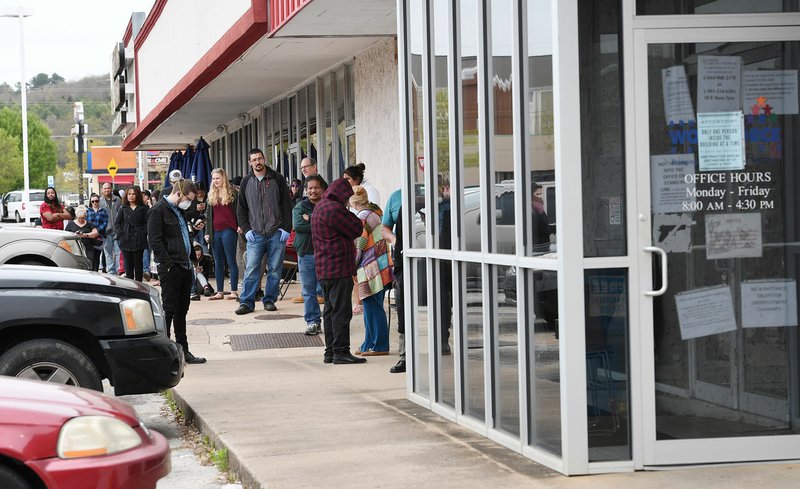Applications for a federal program that helps feed the poor almost doubled from February to March and are on track to climb again in April, state Department of Human Services figures show.
More applications for the Supplemental Nutrition Assistance Program came in during the first 10 days of April than in all of February, those figures show.
To apply for a variety of state benefits, go to access.arkansas.gov
"We definitely think the increase is a result of the economic impact of the pandemic," said Amy Webb, spokeswoman for the department, referring to the coronavirus outbreak. State claims for unemployment benefits set a record in March.
The food program is open to households below certain income levels. Those eligibility levels are affected by factors including the number of children in the household and whether any people living there are elderly or disabled.
A healthy adult younger than 60 years old who is living alone with a gross monthly income of less than $1,316 would qualify. Savings or other assets held by the applicant could prevent the person from qualifying.
[CORONAVIRUS: Click here for our complete coverage » arkansasonline.com/coronavirus]
Many of the people in need of food will find their way barred by some of the most strict eligibility requirements in the nation, said Laura Kellams, Northwest Arkansas director of Arkansas Advocates for Children and Families.
"Arkansas has the strictest asset test in the nation for receiving SNAP benefits, the highest allowed by federal law," Kellams said Monday.
Having $2,250 in any asset, such as a checking or savings account, disqualifies an applicant from benefits, state application guidelines show. That would disqualify, for instance, people who had saved before the pandemic to buy a car or pay a deposit and first month's rent on a better place to live, then lost their jobs, she said.
"We've cut some pretty big holes in our safety net over the years, and now we're having a lot of people fall through them," Kellams said.
The nutrition program gives recipients a debit card that can only be used to purchase nonprepared food items. The benefits average $240 monthly per household, Webb said. That works out to less than $3 per meal, based on three meals a day for a month.
A little more than 21,000 households in Arkansas applied for the benefits in February, according to figures forwarded by Webb. Applicants in March reached 39,205, an 86.7% increase, those figures show.
The figures Webb released Monday show 19,652 applications filed in the first 10 days of April -- almost 2,000 applicants a day. About 94% as many people applied in the first 10 days of April as applied during February.
Applications don't reflect the number of individuals but rather the number of households, said Tomiko Townley, director of advocacy for the Arkansas Hunger Relief Alliance, a nonprofit affiliation of groups seeking to reduce hunger in the state. An estimated average of 355,000 people a month received some assistance from the nutrition program in 2019, she said.
The outbreak's effects will increase the number, she said.
Her group is trying to get the state Legislature during its current fiscal session to relax the asset requirement.
Such specific requirements complicate the effort to get applications processed, Townley said.
"Caseworkers are doing all they can do, and now they're having a massive increase in applications," she said. "In addition to that, there are all these new requirements put on them by the new rules the federal government has passed in measures to deal with the pandemic."
The complications build on one another, Townley said. Applicants who qualify for the nutrition program automatically qualify for other programs such as low-income energy assistance, which is designed to help people save on energy costs by better insulating their homes.
If people don't get food benefits, then they also would have to apply separately for the energy program, she said.
The Human Services Department is compiling application information for other programs benefiting the poor and the recently unemployed, Webb said.
Meanwhile, other state agencies are similarly hit with large increases in people applying for benefits.
The state received 132,000 unemployment claims between the end of March and April 10, Mike Preston, Arkansas' secretary of commerce, said Friday. The state takes in about 1,400 applications in a normal week. It received 30,000 applications in the last week of March, figures show.
Those applications didn't include the newly eligible, such as those who are self-employed.
Metro on 04/14/2020

